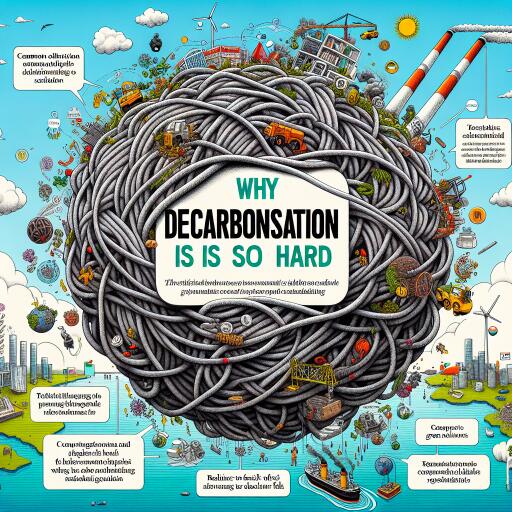
Why Decarbonisation Is So Hard
In the urgent quest to mitigate climate change, the term ‘decarbonisation’ has emerged as a critical goal. This objective, aiming to achieve net-zero carbon emissions by 2050, is not just a noble pursuit but a necessary action to sustain life as we know it on planet Earth. However, despite the clarity of the goal and the technologies available to reach it, the journey towards decarbonisation is proving to be a tumultuous one.
A landmark analysis reveals that an overwhelming majority, over 85 percent, of the solutions required for net-zero emissions within the next few decades are already within our grasp, thanks to existing technologies. This statistic brings both hope and frustration, emphasizing the potential within reach but also spotlighting the slow pace of progress.
Delving deeper into the economic implications, the narrative around decarbonisation transcends environmental preservation. The financial upside to significantly reducing carbon emissions is staggering, with estimations suggesting a net value boost of up to US$85 trillion. These figures spotlight the dual benefit of decarbonisation efforts: safeguarding the planet while potentially unlocking an economic windfall.
Despite the clear benefits, global initiatives to decrease carbon emissions are lagging. Recent findings indicate that the last decade saw greenhouse gas emissions averaging around 56 gigatons annually. This stark number contrasts sharply with the objectives set by environmental experts and underscores the scale of the challenge ahead.
A closer examination of the energy sector illustrates the scale of transformation required. Transitioning from coal to renewable energy sources, a crucial step for decarbonisation, is no small feat. According to estimates, this change necessitates a seismic shift in our renewable energy infrastructure. Specifically, this would involve a fivefold increase in wind turbine installations and an expansion of solar panel deployment by eight times the current rate. These figures not only illustrate the magnitude of the task but also the significant gap between current efforts and the required pace of change.
The road to decarbonisation is not just a path of technological advancement and economic investment. It is a journey that requires profound shifts in policy, societal choices, and global cooperation. The technology exists, and the economic incentives are clear, yet the progress made thus far is insufficient. This disparity between potential and action highlights a complex array of barriers, from political will and regulatory frameworks to financial mechanisms and public acceptance.
In essence, the challenge of decarbonisation is not solely one of innovation but equally of implementation. As the clock ticks towards the critical deadline of 2050, the window for taking effective action narrows. The path forward demands a collective effort that spans nations, industries, and communities.
The journey towards a decarbonised future is fraught with obstacles but also ripe with opportunity. The task ahead is daunting, yet the blueprint for success is within reach. It will require bold leadership, transformative policies, and an unwavering commitment to change. The rewards, however, promise a healthier planet and a more prosperous economy for generations to come.
As the world grapples with the enormous task of decarbonisation, the urgency to act has never been clearer. The tools, technologies, and potential economic benefits lay the groundwork for a sustainable future, but realizing this vision will depend on the actions taken today. The road ahead is challenging, yet it is one we must navigate to safeguard the future of our planet and humanity.





Leave a Reply